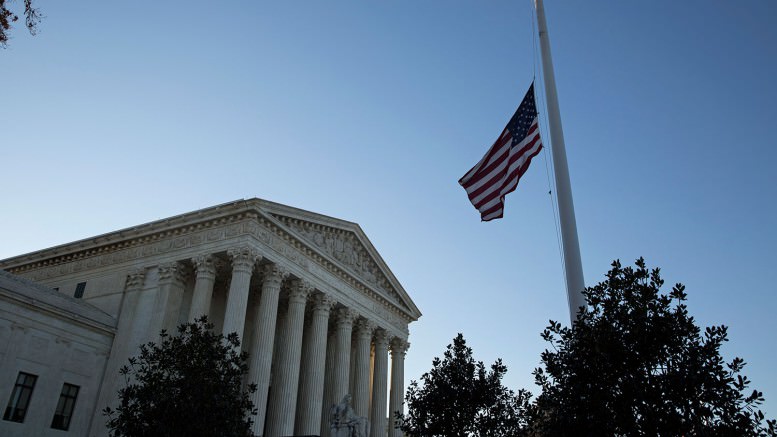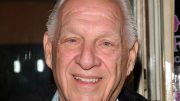Merrick Garland not only has a chance to be the U.S. Supreme Court’s next justice. He also stands to become the most important one.
In a career highlighted by oversight of the Oklahoma City bombing prosecutions and 19 years on a federal appeals court in Washington, Garland established a moderate record that could put him squarely in the middle of the often-divided Supreme Court. He will first have to win Senate confirmation, an uncertain prospect given the insistence of Senate Republicans that they won’t consider any nominee from President Barack Obama.
Garland, 63, would potentially be the pivotal vote on some of the country’s most divisive issues, including campaign finance, gun control, abortion and class action lawsuits. He would replace the late Justice Antonin Scalia, the anchor of the court’s conservative wing, and probably supplant Justice Anthony Kennedy at the court’s center. His confirmation would put five Democratic appointees on the court for the first time since 1969.
His judicial career has shown him to be generally deferential to the work of federal regulatory agencies and skeptical of claims by criminal defendants. Because the U.S. Court of Appeals for the D.C. Circuit’s caseload is heavily focused on regulatory questions, he has said little on high-profile social issues including abortion and religious rights. His opinions tend to be narrow ones, said Washington appellate lawyer Andy Pincus.
“Judge Garland does not make broad pronouncements about the law,” said Pincus, a partner at Mayer Brown. “He focuses on the facts of the particular case and what has to be decided to resolve that dispute.”
In a ceremony in the White House Rose Garden, Obama hailed Garland as consensus-builder, while Garland characterized himself as a judge who has tried to put his personal views to the side.
‘Fidelity’ to Constitution
“Fidelity to the Constitution and the law has been the cornerstone of my professional life,” Garland said. “And it is the hallmark of the kind of judge I have tried to be.”
Republicans generally declined to criticize Garland, saying only that the vacancy should be filled by the next president.
“I think highly of Judge Garland,” said Utah Republican Senator Orrin Hatch. “But his nomination doesn’t in any way change current circumstances. I remain convinced that the best way for the Senate to do its job is to conduct the confirmation process after this toxic presidential election season is over.”
Carrie Severino, chief counsel of the Judicial Crisis Network, said Garland had shown a “general hostility” toward gun rights. When a panel of judges struck down the District of Columbia’s handgun ban in 2007, Garland voted to reconsider the case, though he didn’t explicitly say how he would rule on the law.
That case ultimately went to the Supreme Court and led to a landmark ruling establishing an individual constitutional right to bear arms for self-defense. “It would be very easy to see him overturning” the Supreme Court ruling, Severino said.
Liberal Critics
Still, the sharpest criticism of the Garland selection came from liberal interest groups that had hoped for a more ideological nominee who would provide ethnic and gender diversity on a court with four white men among its eight justices.
“It’s deeply disappointing that President Obama failed to use this opportunity to add the voice of another progressive woman of color to the Supreme Court,” Charles Chamberlain, executive director for Democracy for America, said in a statement. He said Obama “instead put forward a nominee seemingly designed to appease intransigent Republicans rather than inspire the grassroots he’ll need to get that nominee through the Senate gauntlet.”
Garland’s record is mixed in some areas of the law. He was part of a 2003 ruling that barred detainees at the U.S. military prison at Guantanamo Bay from filing lawsuits in federal court to seek release. The Supreme Court later overturned that ruling. Five years later he wrote a ruling that rejected the government’s “enemy combatant” designation for a Chinese man held at the base.
Garland led three-judge panels that backed the National Labor Relations Board when it ordered an Indianapolis company to reinstate workers who were fired after holding a strike to protest actions taken against a co-worker, and when the board ruled against a California lumber supply company that withdrew recognition of a union.
Bin Laden Photos
On transparency of government actions, Garland was part of a panel that said the government could withhold pictures of Osama bin Laden’s corpse and burial at sea from public release. He wrote an opinion that ordered the Secret Service to disclose some White House visitor logs to the public.
He also wrote for a three-judge panel that ruled in 2013 that the Central Intelligence Agency couldn’t decline to “confirm or deny” whether it had documents related to the government’s use of drone strikes for targeted killings. The American Civil Liberties Union was seeking the documents in a Freedom of Information Act case. Garland said Obama and other high-ranking officials had acknowledged the use of drone strikes, so an agency with the word “intelligence” in its name couldn’t claim not to know about it.
“As it is now clear that the agency does have an interest in drone strikes, it beggars belief that it does not also have documents relating to the subject,” Garland wrote. “It is implausible that the CIA does not possess a single document on the subject of drone strikes.”
Judge Friendly
Garland’s resume bears similarities to that of Chief Justice John Roberts. Like Roberts, Garland is a Harvard Law School graduate who clerked for federal appeals court judge Henry Friendly and later took a seat on the D.C. Circuit.
Garland also clerked for Justice William Brennan and worked in the Clinton administration’s Justice Department. In the latter role, he oversaw the Oklahoma City bombing investigation and the successful prosecution of Timothy McVeigh.
The Chicago native is the oldest Supreme Court nominee since President Richard Nixon appointed 64-year-old Lewis Powell in 1971.
Source: www.bloomberg.com





Be the first to comment on "Garland Could Claim Supreme Court’s Ideological Center"